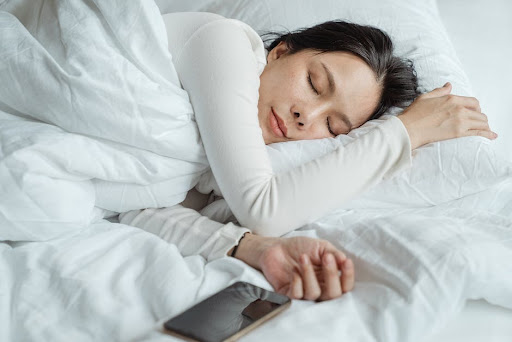Substance misuse affects sleep patterns, and many people in recovery struggle to establish and maintain a healthy sleep cycle. However, quality sleep is essential to maintaining positive physical and mental health. According to the National Institutes of Health (NIH), “Sleep services all aspects of our body in one way or another: molecular, energy balance, as well as intellectual function, alertness and mood.” Buena Vista Recovery offers addiction treatment in Arizona and helps clients develop healthy sleep patterns and routines to support long-term sobriety. The care team can help you find healthy ways to improve your sleep.
Substance Misuse and Sleep Disturbances
Most addictive substances have the potential to impact your sleep patterns. According to the Substance Abuse and Mental Health Services Administration (SAMHSA), “Sleep problems are a common complaint among people with substance use disorders (SUDs). They can occur during withdrawal, but they can also last months and years into recovery and can be associated with relapse to substance use.” Arizona addiction recovery centers provide clients with a structured environment to support a healthy and consistent sleep schedule.
The Importance of Quality Sleep
Quality sleep ensures you feel energized and rested the next day. Individuals recovering from SUD have a lot of healing to do in the first few months of treatment. The body heals during the deepest part of sleep. Chronic sleep disturbances can interfere with your physical healing and recovery. The CDC recommends that adults get between seven and nine hours of sleep each night.
Not getting enough sleep reduces the effectiveness of treatment. However, maintaining positive sleep patterns does the following:
- Ensures you have enough energy throughout the day
- Improves cognitive and physical functionality
- Decreases symptoms of anxiety and depression
- Reduces the risk of relapse
- Improves memory and focus
- Reduces mood swings and emotional instability
Without quality sleep, you have an increased risk of relapsing and experiencing other complications during recovery. According to Medical Clinics of North America, “[S]leep dysfunction in the context of substance misuse may contribute to increased severity of Substance Use Disorder (SUD), impaired quality of life, comorbid psychiatric complaints, suicidal behavior and psychosocial problems.” Treatment programs introduce a structured daily schedule to help clients establish healthy nighttime routines and reduce sleep disturbances.
How Do Fentanyl and Opioids Affect Your Sleep?
Fentanyl and opioids, including morphine, affect sleep in various ways. According to Anasetheology, “[M]orphine and fentanyl . . . increase lighter stage 2 NREM sleep, decrease stage 3 and 4 NREM sleep, and decrease or eliminate REM sleep.” REM sleep is responsible for memory and emotion processing, dreaming, and other essential functions. Healthy individuals have between three and five cycles of REM sleep each night. Brain development may affect young adults who don’t get enough REM sleep each night.
Chronic misuse of fentanyl or opioids causes chronic sleep dysfunctions, impacting overall health and well-being. Drug and alcohol centers in Arizona educate clients on how sleep affects recovery from fentanyl or opioids. The care team at Buena Vista Recovery also provides clients with a list of ways to decrease sleep disturbances.
How Does Alcohol Impact Your Sleep?
Alcohol use disorder (AUD) is one of the most common substance disorders worldwide. The effects of misusing alcohol vary considerably from person to person. However, most people with AUD experience some form of sleep disturbances, including insomnia, oversleeping, or interrupted sleep. Many people with AUD also have co-occurring mental health issues, and the combination often interferes with a person’s ability to get quality sleep each night.
According to the Handbook of Clinical Neurology, “Alcohol acts as a sedative that interacts with several neurotransmitter systems important in the regulation of sleep.” Alcohol often causes people to wake multiple times throughout the night, interrupting their sleep cycle and making it more difficult to fall back asleep. In addition, alcohol misuse also has a negative effect on REM sleep.
Treatment Options for Co-Occurring Sleep Disturbances
Some people experience sleep disturbances unrelated to their substance misuse. However, the lack of proper sleep affects treatment and recovery regardless of the direct cause. According to MedlinePlus, “There are more than 80 different sleep disorders.”
Common co-occurring conditions that contribute to sleep disturbances include:
- Insomnia
- Sleep apnea
- Restless leg syndrome (RLS)
- Hypersomnias, including narcolepsy
- Parasomnia
Programs at Buena Vista Recovery address co-occurring sleep disturbances using a variety of treatments, including:
- Psychotherapy and counseling
- Peer support groups
- Prescription medications
- Nutritional coaching
Clients are encouraged to find healthy ways to adjust their schedules and habits to support better sleep. The care team also guides clients through using their coping techniques to practice self-care. Individuals who regularly engage in self-care generally have fewer daily stressors and manage their triggers more effectively, reducing stress-related sleep disturbances. Intensive outpatient programs (IOP) allow people to practice establishing and maintaining healthy sleep patterns.
Getting enough sleep ensures you have the energy and focus to heal and move forward in your recovery. Substance use disorder and co-occurring mental health issues profoundly affect a person’s quality of sleep. You might find yourself constantly feeling tired or rundown. In many cases, substance misuse changes how the brain functions during sleep, impacting the effectiveness of sleep cycles. Sleep disturbances directly affect physical and psychological health. Part of treatment for SUD involves creating and maintaining a sustainable bedtime routine to encourage healthy sleeping habits. The dedicated care team at Buena Vista Recovery uses psychotherapy and alternative holistic therapies to help clients establish more restorative sleep patterns. To learn more about our programs, call us at (480) 741-9414.




